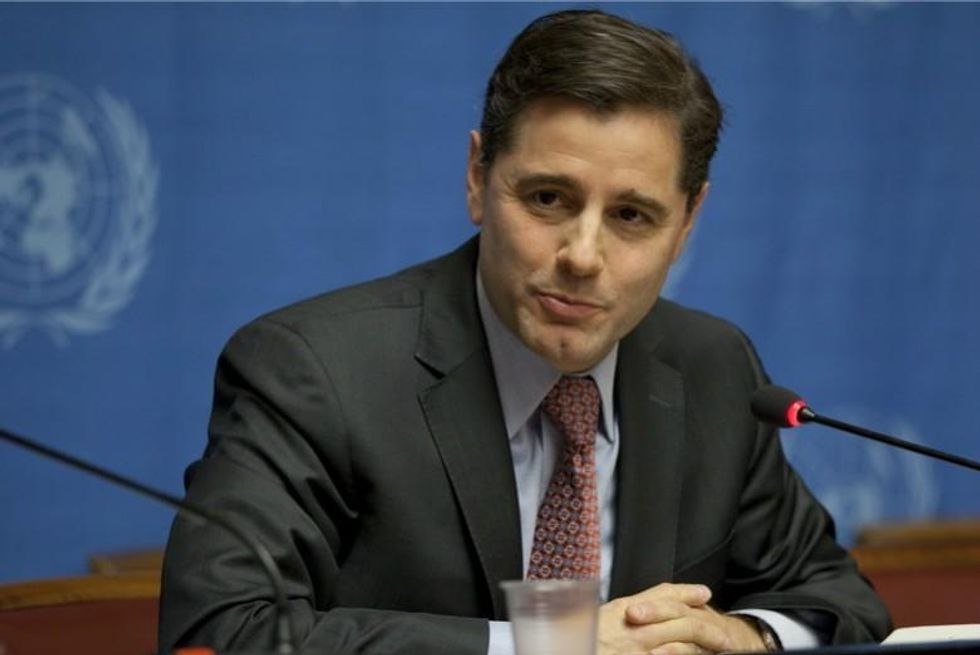In announcing his departure as chairman of the Federal Communications Commission, Julius Genachowski said: "The last four years have demonstrated that the country needs an effective FCC."
The FCC's decisions are at the heart of our ability to communicate. The agency oversees sectors of the economy responsible for hundreds of billions of dollars in economic activity and millions of jobs.
The impact of FCC rulings far outlasts the commissioners who make them. FCC policies from the 1960s led to the creation of the Internet; decisions being made now threaten the Internet's future.
Over the past four years, Genachowski focused on broadband to the near-total exclusion of all other issues. But his actions consisted primarily of cheerleading industry players and taking credit for marketplace developments that would have happened anyway.
When he took the helm, most consumers had at best two choices for home broadband: the local phone company or the local cable company. Four years later, we have the same two choices -- only now they cost more.
While campaigning for the presidency in 2008, Barack Obama promised to "take a back seat to no one in my commitment to Net Neutrality." But Obama's FCC chair wilted under pressure from big providers like AT&T and Comcast, scrapping stronger Net Neutrality protections in favor of loophole-ridden half-measures that offer too little protection for consumers or innovators.
Genachowski's failure to re-establish the FCC's authority over broadband was his most significant policy blunder -- and the defining moment of his tenure. When a federal court ruling exposed the shortsighted folly of the Bush administration's decision to change how the FCC regulates broadband, Genachowski should have moved immediately to "reclassify" broadband under the law. But he retreated under a predictable but fact-free industry backlash. In that moment, corporations learned just how easy Genachowski was to push around.
Fold, Fold and Fold Again
Even on matters that should have been easy lifts, Genachowski found a way to buckle. He released the National Broadband Plan to much fanfare. But he never collected meaningful broadband data -- the plan's first and most basic recommendation. This failure didn't stop Genachowski from crowing in nearly every speech about how he was making the agency "data driven."
When Genachowksi's FCC did act on consumer issues, it generally did nothing more than bless industry's toothless and voluntary codes of conduct on issues like "bill shock." To his credit, Genachowski did oppose the AT&T/T-Mobile merger -- though he spoke out only after the Department of Justice filed suit to stop the deal. And he still pushed the wireless industry's self-serving notion of a looming "spectrum crunch" when the real problem is the absence of real competition in the market.
One of Genachowski's supposed marquee achievements was reform of the Universal Service Fund (an $8 billion annual program run through the FCC and funded by phone-bill fees). For too long, this program has padded phone-company profits and subsidized outdated technologies. But Genachowski's "reform" did nothing to make providers more accountable and actually ended up raising consumers' bills.
He also ignored the never-ending cable rate increases and made matters worse by approving the Comcast-NBCU merger. And after Comcast began imposing data caps to favor its online video services over competing platforms like Netflix, Genachowski gave a speech in front of the cable lobby in which he endorsed these pointless restrictions. He even hired an industry-funded proponent of data caps as the FCC's chief economist.
I haven't mentioned broadcasting -- one the main areas of the FCC's jurisdiction -- but neither did Genachowski until he had one foot out the door. And then it was only to push a disastrous media consolidation proposal. He paid no attention to the issue of media diversity, even though women and people of color own just a tiny fraction of broadcast licenses.
In the end, Genachowski's only real priority seemed to be getting good press, though that didn't really happen either. If the chairman had spent half as much time earning support for his actions as he did trying to line up photo ops and balloon drops (not to mention editing his Wikipedia page), then maybe he'd have an actual legacy.
Goodbye and Good Luck
Of course, that hasn't stopped much of official D.C. from praising Genachowski -- with the same talk of vision and public service they throw at anybody cashing out. But in reality, Genachowski has left his successor a real mess:
- Net Neutrality: Verizon is suing to overturn Genachowski's weak Open Internet rules and trying to eliminate the FCC's authority to adopt any rules. If the FCC loses, nothing will stop providers from closing down the free and open Internet.
- Broadband authority: If the FCC loses the Net Neutrality case, this will likely leave the agency not only powerless to stop ISPs from blocking websites, but without any ability to promote universal broadband deployment, protect consumers from predatory prices, or ensure access for the disabled.
- IP transition: AT&T is exploiting a loophole in the FCC's policies to try to jettison all federal and state regulations that, among other things, require it to serve all customers and keep the price of basic landline service affordable. AT&T wrongly claims these fundamental consumer protections are a relic of the rotary-dial era, and how the FCC proceeds here will have far-reaching consequences for every Internet user.
- Wireless devices: Today consumers are free to use whatever device they choose on wired or Wi-Fi broadband networks. But mobile providers lock phones and tablets, keeping prices for both devices and wireless service itself artificially high. The White House recently urged Congress and the FCC to legalize cellphone unlocking. The next chair should stand up for our right to use our devices anywhere and any way we choose.
- Media Diversity: The next FCC chair will need to conclude the congressionally mandated review of the agency's media ownership rules. If the next chair hopes to see ownership policies upheld in court, the agency must conduct independent studies that determine whether the FCC's rules promote ownership diversity -- studies Genachowski repeatedly refused to do.
All these issues illustrate how powerful industry players will do anything to protect their narrow short-term interests. We need an FCC chair with the political courage to promote the public interest. We need someone willing to fight for policies that foster genuine competition, protect diversity and amplify local voices. We need someone who will stand up to industry giants and their surrogates in Congress.
In other words, we need to tell President Obama to appoint an FCC chair who is absolutely nothing like Julius Genachowski.




